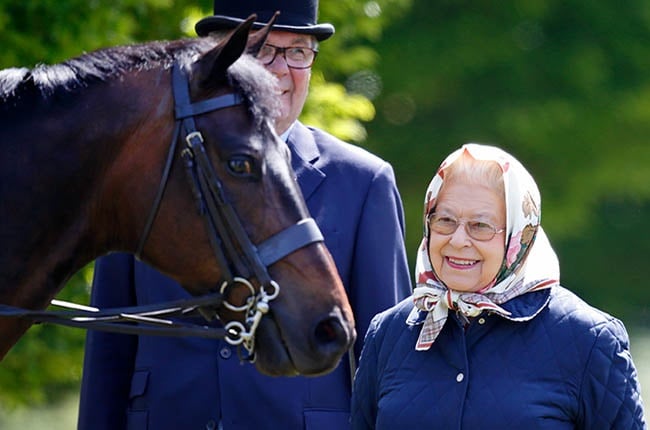
- Queen Elizabeth II died aged 96 and was a functioning head of state, even in the last few years of her life.
- Other UK monarchs lived to an age higher than the average life expectancy of the general population.
- Such differences in lifespan in the royal family are not uncommon, explains one researcher.
Long lived the queen. And many of the royals that came before her.
Queen Elizabeth II, who died on 8 September, was the longest reigning monarch in British history.
The cause of her death, at age 96, remains undeclared, but an official statement stated that she "died peacefully" at Balmoral Castle in Scotland.
Her husband, Prince Philip, Duke of Edinburgh, died aged 99 in 2021 – just 10 months before his 100th birthday, while the late monarch's mother, Queen Elizabeth I, continued to live a remarkably long and active public life until just a few months before her death at the age of 102.
READ MORE | What did the queen eat? Her Majesty's all-time favourite foods and what she wanted off the menu
Princess Alice of Albany, the last surviving grandchild of Queen Victoria and the longest-living British princess of the blood royal family, lived to age 97.
The queen, who served seven decades on the throne, lived more than a decade longer than the 82.9-year life expectancy for the average British woman. And at 73 years, King Charles is the oldest person to take the British throne – but is in good health and fit to do so.
Is the royal family hiding the secret to a long, healthy life?
Many public online discussion forums, including Quora and Reddit, have asked these questions.
'A fascinating story'
According to an article by The Conversation, it's not unlikely for UK monarchs to outlive their subjects by 30 years.
Author of the article S. Jay Olshansky, professor of epidemiology and biostatistics at the University of Illinois in Chicago, analysed the duration of life of the last six British monarchs – up to Queen Elizabeth – along with the longevity of their spouses and children, which totalled 27 royals. The average duration of the life of the spouses of the monarchs was also a lengthy 91.7 years, he adds.
While the monarchs and their spouses enjoyed long lives, "by contrast, the average life duration of the wider UK population for the years the monarchs were born throughout this period was only 46 years, according to figures from the Human Mortality Database," explains the professor.
READ MORE | The longest-living people on Earth eat these 6 foods
"What it reveals is a fascinating and familiar story for those of us who study ageing and longevity for a living," he writes.
Olshansky had also previously observed that US presidents tended to live decades longer than the general population they served.
So what's at play?
Genetic, as well as social and behavioural factors, according to Olshansky.
Winning the genetic lottery
"No one can live long without first having won the genetic lottery at birth," writes Olshansky.
"To maximise the chances of achieving exceptional longevity – upward of 85 years old – you must begin by being lucky enough to have long-lived parents. But even for those blessed with the gift at birth of the potential for a long life, this is no guarantee you'll outlive your contemporaries."
Research suggests that your genes are an important indicator of your probable lifespan. As explained by Scientific American, the link between genes and longevity are influenced in at least two important ways: a person may inherit certain genetic variations that predispose them to disease that decreases longevity, while other gene variants may confer disease resistance, thereby increasing it.
But genetics only account for around 20 to 30% of your chance of living to 85 years, data shows.
The other factors
Apart from genetics, lifestyle factors go hand in hand with longevity. That means avoiding habits that are associated with a shorter life, such as smoking, overeating (which can lead to health issues that shorten life, like obesity), being inactive, and eating unhealthily.
One should eat breakfast like a king, lunch like a prince, and dine like a pauper, the old adage goes. And Queen Elizabeth kept her meals light indeed. Former royal chef Darren McGrady previously told the BBC that the monarch's lunch and supper would be "something light".
And while the queen may not have been a fan of the gym, she was a "great believer in sensible exercise", notes her biographer Ingrid Seward. She was also a keen horse rider, and walking was one of her favourite exercises. She would take a daily stroll around the gardens of Buckingham Palace with her corgis.
READ MORE | How many steps per day are needed for longevity? Fewer than 10 000, says large study
The queen also cut out carbs from her diets when dining alone. "She'd cut out the potatoes, pasta and rice. She'd have something like grilled fish or chicken with salad and vegetables," said McGrady.
Then, of course, comes poverty and privilege. "Being born into or living in poverty has been shown to be one of the most important factors that shortens lifespan – and it is here that perhaps the royals have the greatest advantage," explains Olshansky.
Several studies have shown this link, including a 1992 study, which focused on life expectancy in Britain. A 2016 Harvard analysis found that low-income residents in wealthy areas, such as New York City and San Francisco, had life expectancies that were significantly longer than those in poorer regions. And research published in 2020 concluded that being wealthy adds nine years to a healthy life expectancy.
So, ultimately, it boils down to a couple of factors: good genes, living a healthy lifestyle, and privilege and wealth.
"The long life of Prince Philip is a cause for celebrating the progress of medical science in being able to keep people alive for longer," writes Olshansky.
"But it is in part the result of a privilege denied to many and a reminder that humanity has a long way to go to equalise the chances of living a long life."




 Publications
Publications
 Partners
Partners











